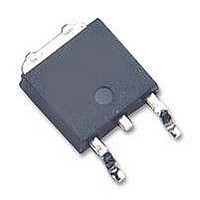LM1085IS-3.3 National Semiconductor, LM1085IS-3.3 Datasheet - Page 9

LM1085IS-3.3
Manufacturer Part Number
LM1085IS-3.3
Description
Linear Voltage Regulator IC
Manufacturer
National Semiconductor
Datasheets
1.LM1085ISX-5.0.pdf
(13 pages)
2.LM1085ISX-5.0.pdf
(13 pages)
3.LM1085ISX-5.0.pdf
(13 pages)
Specifications of LM1085IS-3.3
No. Of Pins
3
Output Current
3A
Termination Type
SMD
Mounting Type
Through Hole
Voltage Regulator Type
LDO Linear
Peak Reflow Compatible (260 C)
No
Current Rating
3A
Output Voltage Max
3.3V
Lead Free Status / RoHS Status
Contains lead / RoHS non-compliant
Available stocks
Company
Part Number
Manufacturer
Quantity
Price
Part Number:
LM1085IS-3.3
Manufacturer:
NS/TI
Quantity:
20 000
Part Number:
LM1085IS-3.3/NOPB
Manufacturer:
NS/国半
Quantity:
20 000
Application Note
must be added, one for case to heat-sink (θ
heatsink to ambient (θ
predicted as follows:
T
T
P
consumption is calculated as follows:
Once the devices power is determined, the maximum allow-
able (θ
θ
The LM1085 has different temperature specifications for two
different sections of the IC: the control section and the output
section. The Electrical Characteristics table shows the junc-
tion to case thermal resistances for each of these sections,
while the maximum junction temperatures (T
section is listed in the Absolute Maximum section of the
datasheet. T
T
θ
follows:
θ
θ
The required heat sink is determined by calculating its re-
quired thermal resistance (θ
JA(max)
JA(max)
JA
JA
J
J
J(max)
D
= T
is junction temperature, T
(max, OUTPUT SECTION) = (150˚C - T
is the power consumption of the device. Device power
(max, CONTROL SECTION) = (125˚C - T
A
JA(max)
is 150˚C for the output section.
+ P
= T
should be calculated separately for each section as
D
R(max)
J(max)
) is calculated as:
(θ
JC
/P
+ θ
is 125˚C for the control section, while
D
= T
CH
HA
). The junction temperature can be
+ θ
J(max
HA(max)
HA
A
(Continued)
− T
) = T
is ambient temperature, and
A(max)
).
A
FIGURE 7. Heat sink thermal Resistance vs Area
+ P
)/P
D
D
FIGURE 6. Power Dissipation Diagram
θ
A(max)
CH
JA
J(max)
A(max)
) and one for
)/P
) for each
)/P
D
D
9
Figure 6 shows the voltages and currents which are present
in the circuit.
θ
θ
θ
TROL SECTION) + θ
θ
SECTION) + θ
If thermal compound is used, θ
C/W. If the case is soldered to the heat sink, then a θ
be estimated as 0 C/W.
After, θ
lower of the two θ
heat sink.
If PC board copper is going to be used as a heat sink, then
Figure 7 can be used to determine the appropriate area
(size) of copper foil required.
HA(max)
HA(max)
HA(max)
HA(max)
I
P
IN
D
= I
HA(max)
= (V
=θ
= θ
should also be calculated twice as follows:
= θ
L
JA
10094764
+ I
JA(max)
IN
JA
(max, OUTPUT SECTION) - (θ
−V
G
CH
is calculated for each section, choose the
(max, CONTROL SECTION) - (θ
OUT
)
HA(max)
− (θ
10094716
) I
CH
L
JC
)
+ V
values to determine the appropriate
+ θ
IN
CH
I
G
CH
)
can be estimated at 0.2
JC
www.national.com
(OUTPUT
JC
CH
(CON-
can














